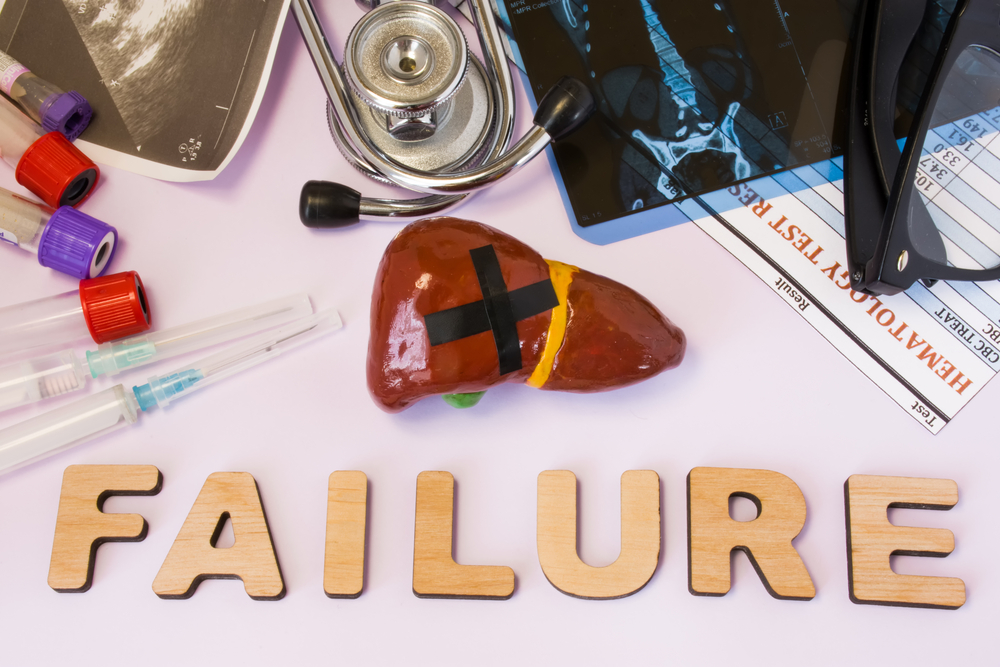
Overview
Acute liver failure (ALF) is a rare condition that denotes a critical impairment in liver function, which results from a severe injury in the liver. This impairment constitutes about 80-90% of the liver cells (hepatocytes)
Drug overdose (like acetaminophen-paracetamol, alcohol abuse), autoimmune diseases (like herpes simplex virus, hypoxia-induced liver injury etc.) and other unknown triggers may cause ALF. The condition is followed by complications such as encephalopathy, impaired protein synthesis, coagulopathy, hyponatraemia etc.
Although this condition is terrible, with a high mortality rate, proper intensive care administration and a successful surgical transplant may procure the patient a promising chance of survival. The epidemiological index shows that hepatitis A, B and E are the leading global causes of acute liver failure in developing nations. On the other hand, drug-induced liver injuries are the leading causes of acute liver failure in developed countries.
Medical Cause
Medically, acute liver failure forms from necrosis (cell death) and apoptosis. This is the result of the reduction of ATP (Adenosine Triphosphate), the primary form of energy used by the body. This ATP loss will lead to the inflammation of the cell.
As examined in encephalopathy, ammonia crosses the altered blood-brain barrier(BBB). Oxidative stress follows. Then ATP is depleted, and anaerobic glycolysis sets in. This leads to astrocyte inflammation and cerebral oedema with symptoms like increased intracranial pressure.
Key Facts
- Acute liver failure results from liver injuries.
- It denotes metabolic errors and liver dysfunction.
- It can be caused by drug overdose, infections, autoimmune disorders and certain physical conditions.
- Acute liver failure also has unknown causes.
- Complications include encephalopathy, impaired protein synthesis, coagulopathy, and hyponatraemia.
- Early diagnosis and treatment are pivotal in treating the condition.
Symptoms
Signs and symptoms of acute liver failure manifest according to the affected organs and systems thus.
The Nervous System
- Altered brain function (e.g. consciousness, mental focus)
- Intracranial pressure
- Mental confusion may progressively lead to coma.
- Loss of pupillary reflexes
Coagulation and Metabolism
- Loss of blood platelets
- Due to the impairment of coagulation and inhibition factors, severe bleeding occurs (intracerebral bleeding)
- Lactic acidosis due to renal failure
- Hypokalaemia
- Metabolic alkalosis
Kidney
Necrosis of kidney cells occurs (such as tubular necrosis)
- Blood in urea
- Impairment in kidney function (renal failure)
Cardiac and Respiratory Functions
- Hypoxia due to poor oxygen delivery
- Pulmonary haemorrhage
- Pleural effusions
Other indications upon physical examination
- Tremors
- Stomach swelling
- Right upper abdominal pains
- Jaundice
- Nauseating and vomiting feelings
Diagnosis
The first action the doctor will take is to collect medical history. Lifelong histrionics of autoimmune diseases like Wilson disease in the patient’s family may cause acute liver failure. The doctor will also carry out a physical examination to diagnose the symptoms. Meanwhile, a quite precise diagnosis will be assigned namely.
- Liver Function Test
Laboratory blood analysis will report the activities of certain enzymes and other substances in the blood. This will assist the doctor study the current functioning of the liver. Indexes are:
- INR of 1.5 or above may indicate liver malfunction.
- Increased aminotransferases, bilirubin, serum creatinine and ammonia.
- Level of acetaminophen
- Glucose level
- Glycolytic activities
This method will detect hypokalemia, hypoglycemia and thrombocytopenia.
- Liver Biopsy
Minute liver samples are extracted transvenously through the transjugular path to observe liver functions. This incision may involve passing a catheter via the jugular vein to incise some part of the blood vessels.
- Imaging/Scan Test
This process implies the use of imaging/scanning techniques to extract images of the abdomen in order to inspect cirrhosis, portal hypertension, and vascular thrombosis. Ultrasound may be approved for kidney injuries. CT scan and MRI will help to clarify issues of altered mental states.
Causes
Acute liver failure could be the result of a vast number of factors which are:
- Drugs
Continuous intake of drugs like paracetamol, alcohol and Tylenol may become potential pointers to acute liver failure. Also, some prescription drugs like NSAIDs and antibiotics may trigger the initiation of acute liver failure. Invariably, supplements and herbal medicine may also lead to acute liver failure.
- Toxins/Poisons
This includes industrial chemicals— toxic substances like wild mushrooms and carbon tetrachloride.
- Diseases
Metabolic diseases, autoimmune diseases, viral infections, and cancer are common risk factors for acute liver failure. These include Hepatitis A, B, E Wilson disease, vascular diseases, sepsis etc.
- Physical Factors
These include extreme shock, which alters hepatic blood flow and heat stroke. They can all lead to acute liver failure.
Prevention
Preventions for acute liver failure include living certain lifestyles and following medical measures like the following :
- You have to moderate the intake of alcohol.
- Moderation in fat intake. Regular exercise may be considered here.
- You should do well to keep your distance from industrial chemicals like fungicides, pesticides etc.
- You can avoid possible means of getting infected. Like avoiding people’s body fluids etc. Better still, get vaccinations for infections
- You have to strictly follow the doctor’s guidance on the use of drugs
Typical Treatment
Common medical treatment for acute liver failure, when appropriately employed by intensive care supervision, will help to maintain the situation.
- Medication
Taking certain medications(like acetylcysteine) can neutralise the effect of the overdose intake of drugs and alcohol. In the same vein, some drugs have counter effects to poisoning agents(like the wild mushroom)
For encephalopathy, Lactulose followed by propofol can be administered for a given period if the complication progresses. For pulmonary issues, the mean arterial pressure can be maintained by vasopressors like epinephrine, norepinephrine, or dopamine. Pulmonary ventilation and catheterisation can be considered for oedema and vascular resistance. For GIT issues, the doctor may consider using haemorrhage prophylaxis with a histamine-2 blocker or proton pump inhibitor.
- Surgical Replacement
A liver transplant may be the most suitable option where the illness cannot be managed. In this method, the donor must pass certain medical qualifications before a transplant can be considered. The survival rate is about 40%. However, a successful liver transplant is vital.
- Nutrition and Replacement Therapy
Replacement therapy is reasonable for metabolic cases. Vitamin K intake for irregular prothrombin time should be considered. Fluid therapy is considerable for hypotension. Enteral/parenteral nutrition is recommended. Protein nutrition of about 60g daily may be approved. Hence, the intake of colloids (like albumin) with dextrose sugar in liquid should be considered. Hypertonic glucose can be given as well upon examination.
- Supportive Care and Treatment
Patients with diseases like hepatitis A and E need supportive treatment. Antibiotics may be ineffective in these cases. Intravenous methylprednisolone can be administered as well. Herpes should be treated with acyclovir.
Conclusion
Acute liver failure is actually life-threatening as the liver is a significant organ with elaborate metabolic key roles to play. Unrestricted use of drugs and alcohol abuse will constantly distract liver functionality by giving it unneeded metabolic labour to engage in, thus causing acute liver failure. Viral infections and autoimmune disorders may alter instructions at a genetic level hence causing abnormalities in protein synthesis.
Therefore, people should vigilantly observe any potential cause of acute liver failure and report to a doctor on time. This will procure a promising option to handle the condition.
MOST COMMON






